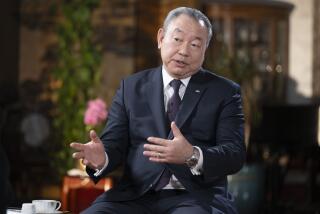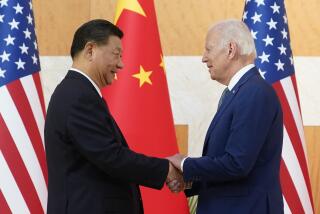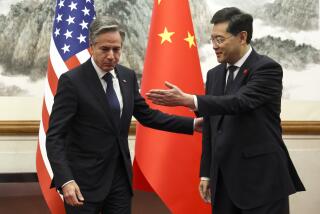Christopher Aims to Smooth Ties With Chinese Official : Asia: Beijing foreign minister reportedly feels he was misled on issue of Taiwan president’s U.S. visit.
- Share via
ANDERSEN AIR FORCE BASE, Guam — As Secretary of State Warren Christopher prepares for an important meeting Tuesday with Chinese Foreign Minister Qian Qichen, he is facing an unusual undertone of personal animosity because of Chinese suggestions that he misled Beijing’s top diplomat the last time the two met.
When Christopher sat down with Qian at the United Nations in April, he told his Chinese counterpart that the Clinton Administration would oppose efforts to bring Taiwanese President Lee Teng-hui to the United States for a visit.
A month later, to China’s considerable dismay, President Clinton yielded to congressional pressure and granted Lee a visa--the first trip to the United States by a leader of Taiwan, which China considers part of its territory.
The Chinese felt they had been burned. Many U.S. experts on China believe that Qian’s own standing within the Chinese leadership--and the Foreign Ministry’s clout within the government--suffered, because Beijing was not warned in advance that Lee would be making the trip.
The controversy over the April meeting serves as a case study in how the growing friction between the Clinton Administration and the Republican-dominated Congress is creating problems for U.S. foreign policy.
In Washington, the question of what Christopher did or did not say to Qian at their last meeting is sensitive enough that State Department officials have been poring over the transcripts of that session as Christopher prepares to meet Qian in Brunei this week.
“I did try to signal to Foreign Minister Qian Qichen the very strong congressional attitudes that existed with respect to the visit of Lee Teng-hui,” Christopher said today to reporters accompanying him across the Pacific.
The secretary of state pointed out that the Congress is “in the hands of a party [which is] not the President’s party.”
“The power of our Congress is quite extraordianry in relation to that of, say, parliamentary government,” Christopher said. “I tried to outline those things to [Qian]. If I was unable to do so, if I was not articulate enough to let him know of that risk, I hope that he now understands better.”
In early May, two weeks after Qian was told that the Clinton Administration opposed Lee’s visit, both the House and Senate overwhelmingly passed non-binding resolutions calling upon Clinton to admit the Taiwanese president.
“You have to be realistic about what the situation is [in Congress],” Christopher said today. “If we did not move forward with what was an entirely appropriate visit [by the the Taiwan president] . . . it might have had a reaction in Congress that would have been harmful to the overall relationship.”
So in mid-May, Clinton reversed course and decided to do on his own what Congress was preparing to force him to do anyway: He switched positions and issued a visa for Lee’s private visit to Cornell University, his alma mater.
In the United States, Clinton’s action was perceived as merely yielding to political reality. But Chinese leaders apparently felt they had been deceived.
Christopher said he hopes that China’s unhappiness about what happened in April will blow over. “The best thing today is to look forward rather than to look back,” he said.
More to Read
Sign up for Essential California
The most important California stories and recommendations in your inbox every morning.
You may occasionally receive promotional content from the Los Angeles Times.













